|
|
|
Sort Order |
|
|
|
Items / Page
|
|
|
|
|
|
|
| Srl | Item |
| 1 |
ID:
125384
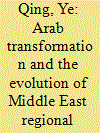

|
|
|
|
|
| Publication |
2013.
|
| Summary/Abstract |
Since its outbreak in the beginning of 2011, the Arab transformation that swept almost the whole middle east has now entered the third year with its geopolitical implications beginning to unfold gradually. When erupted in Tunisia and Egypt, it was driven primarily by internal dynamics and was regarded as a genuine local, bottom up movement in general. Much to people's surprise, incumbent regimes such as the Mubarak regimes in Egypt and Ben Ali regime in Tunisia that were once considered to be durable and formidable were too quick to be overthrown.
|
|
|
|
|
|
|
|
|
|
|
|
|
|
|
|
| 2 |
ID:
133547
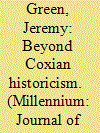

|
|
|
|
|
| Publication |
2014.
|
| Summary/Abstract |
This article scrutinises Robert Cox's theorisation of 19th century world order, proposing 'uneven and combined development' as an alternative conceptual approach. I contend that Cox's understanding of 19th century world order is insufficient as it neglects the significance of German ascendance. Privileging hegemonic construction of world order, Cox's account of the decomposition of Pax Britannica reifies the neo-realist anarchy problematique. Overall, Cox exaggerates the degree of rupture between phases of world order, obscuring developmental continuities that produce different 'geopolitical' contexts. Uneven and combined development, I propose, enables a fruitful reappraisal of the period. Process-based international historical sociology is suggested as an alternative way to think about 19th century world order and critical IR.
|
|
|
|
|
|
|
|
|
|
|
|
|
|
|
|
| 3 |
ID:
124204
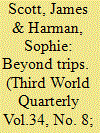

|
|
|
|
|
| Publication |
2013.
|
| Summary/Abstract |
The current round of World Trade Organization (WTO) negotiations-the Doha Round-has significant implications for global health which have received insufficient attention from the global health community. All too often the health implications of global trade agreements are examined only after their conclusion, and are concerned only with intellectual property rights. This paper seeks to move beyond this narrow focus and elucidate the wider health implications of the Doha Round. It explores the negative effect of the Round on state capacity to provide and regulate health services in low-income countries, and the impact it will have on livelihoods among the poor and their ability to access health services. Overall the paper makes the case for greater engagement from the health community with the wto and the Doha Round negotiations beyond the customary focus on intellectual property rights.
|
|
|
|
|
|
|
|
|
|
|
|
|
|
|
|
| 4 |
ID:
124605
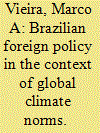

|
|
|
|
|
| Publication |
2013.
|
| Summary/Abstract |
This article is an enquiry into Brazil's evolving responses to global climate change norms. Following an overview of the evolution of international normative frameworks of climate change governance, I examine the relationship between some of these international norms and domestic environmental politics in Brazil. Internationally, the analysis focuses on the North/South political debate about climate change and its role in shaping understandings about the impact and responses to global warming. Domestically, I explore the evolving relationship between state and private actors in the decision-making process. I argue that Brazil's official position on climate change negotiations is currently influenced by a nationalist/developmental approach based on the particular worldview of the dominant faction within the foreign ministry and backed up by private groups, powerful sectors in the military establishment, key ministries, and the presidency. Yet, this worldview has been increasingly undermined/permeated by other state and nonstate actors, who are more closely aligned with the environmental concerns of international stakeholders. The ensuing domestic conflict has important implications for the legitimacy and coherence of the Brazilian position in international climate change negotiations
|
|
|
|
|
|
|
|
|
|
|
|
|
|
|
|
| 5 |
ID:
127600
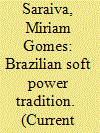

|
|
|
|
|
| Publication |
2014.
|
| Summary/Abstract |
Over the past decade, amid growing international fragmentation and declining US hegemony, Brazil has assertively expanded its participation in multilateral forums as part of a diplomatic strategy that envisions a reformulation of international institutions. At the same time, Brazil has also worked on building a leadership role within South America. These global and regional aims continue to shape the country's use of soft power. Indeed, soft power-defined by the political scientist Joseph S. Nye Jr. as influencing the behavior of others via attraction or persuasion rather than coercion or payment-is nothing new in Brazil's international dealings. Since the early 1900s, the nation has used such a strategy under different labels in conjunction with two beliefs central to its foreign policy: the need to build and assure Brazil's autonomy in its development strategy and foreign policy choices, and the desire to raise its global political profile
|
|
|
|
|
|
|
|
|
|
|
|
|
|
|
|
| 6 |
ID:
129104
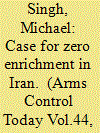

|
|
|
|
|
| Publication |
2014.
|
| Summary/Abstract |
In the debate over sanctions on Iran-their role in bringing Tehran to the negotiating table and their proper place in U.S. diplomatic strategy in the future-scant attention has been paid to a major shift in the negotiating position of the P5+1, the group of six countries (China, France, Germany, Russia, the United Kingdom, and the United States) that is negotiating with Tehran over the Iranian nuclear program. No longer is the P5+1 demanding that Iran halt uranium enrichment. Indeed, in the November 24 first-step nuclear accord, the Joint Plan of Action,[1] the P5+1 all but concedes that Iran will be permitted to enrich in perpetuity. In separate comments that have quickly become conventional wisdom among Iran analysts, U.S. negotiators now characterize their previous position that Iran should halt enrichment as "maximalist."[2] Although undoubtedly expedient, this shift away from a zero-enrichment negotiating position is misguided and unnecessary.[3] The U.S. shift away from zero enrichment to limited enrichment represents a significant diplomatic victory for Iran. For the last decade, the position of the EU-3 (France, Germany, and the UK) and then the P5+1 had been that Iran must "suspend all enrichment-related and reprocessing activities, including research and development." This position was enshrined as an Iranian obligation in a series of UN Security Council resolutions.[4] Iran, however, asserted a "right to enrich" and refused to halt enrichment after resuming it when nuclear talks with the European Union broke down in 2005. This difference formed the core of the confrontation that subsequently developed between Iran and the allies.
|
|
|
|
|
|
|
|
|
|
|
|
|
|
|
|
| 7 |
ID:
129103
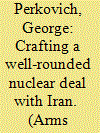

|
|
|
|
|
| Publication |
2014.
|
| Summary/Abstract |
A final nuclear deal with Iran should meet the underlying objective of the relevant UN Security Council resolutions since 2006: "the establishment of international confidence in the exclusively peaceful nature of Iran's nuclear programme."A final agreement could be codified and endorsed through a new resolution, which need not include all of the specific instrumental elements of past resolutions-for example, suspension of all uranium enrichment-if the council determines that the overall objective has been met. As the resolutions acknowledge, to be durable, such an agreement also must satisfy Iran's interest in having a purely peaceful nuclear program free from sanctions. The devilish challenge will be in the details. History will inform each party's requirements. The six-country group that has been negotiating with Iran, the so-called P5+1 (China, France, Germany, Russia, the United Kingdom, and the United States), will remember that Iran secretly had, at least until 2003, what appeared to be a dedicated, multifaceted program to acquire capabilities to produce nuclear weapons. Iran still has not cooperated fully with the International Atomic Energy Agency (IAEA) to clarify these activities and continues to expand sensitive fuel-cycle capabilities beyond any plausible civilian requirement. Iranian leaders, for their part, remember numerous episodes that reflect a U.S. determination to hasten an end to their regime.
|
|
|
|
|
|
|
|
|
|
|
|
|
|
|
|
| 8 |
ID:
128552
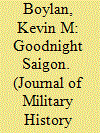

|
|
|
|
|
| Publication |
2014.
|
| Summary/Abstract |
This article tests the veracity of the Revisionist thesis that the United States effectively won the Vietnam War in the years after Tet 1968. Since quantitative indicators could not accurately measure who was winning the "War in the Villages," it relies instead upon qualitative assessments made by U.S. Province Senior Advisors-the Americans best qualified to make such judgments. It is organized into three sections dealing with the key Revisionist claims that the Vietcong insurgency was defeated, the Saigon regime gained control of practically the entire rural population, and the South Vietnamese armed forces became capable of standing on their own.
|
|
|
|
|
|
|
|
|
|
|
|
|
|
|
|
| 9 |
ID:
124942
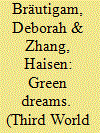

|
|
|
|
|
| Publication |
2013.
|
| Summary/Abstract |
What role does China play in the recent rush for land acquisition in Africa? Conventional wisdom suggests a large role for the Chinese government and its firms. Our research suggests the opposite. Land acquisitions by Chinese companies have so far been quite limited, and focused on production for African consumption. We trace the evolution of strategy and incentives for Chinese agricultural engagement in Africa, and examine more closely several of the more well known cases, sorting out the myths and the realities.
|
|
|
|
|
|
|
|
|
|
|
|
|
|
|
|
| 10 |
ID:
133572
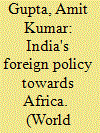

|
|
|
|
|
| Publication |
2014.
|
| Summary/Abstract |
India has been using benign means to develop its relations with Africa based on consultations and cooperation, mediated by an increasingly active diplomacy. Mohammed Badrul Alam and Amit Kumar Gupta aver that in contrast to China's strategy, India has focussed on capacity building rather than infrastructure development.
|
|
|
|
|
|
|
|
|
|
|
|
|
|
|
|
| 11 |
ID:
124875
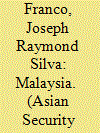

|
|
|
|
|
| Publication |
2013.
|
| Summary/Abstract |
The October 2012 Framework Agreement on the Bangsamoro between the Philippines and the Moro Islamic Liberation Front was a milestone in the peace negotiations. Attributing this success solely to Philippine President Benigno Aquino III's popularity fails to account for Malaysia's peace facilitation. Keeping the talks on track appeared counterintuitive as Filipino public opinion often cast Malaysia as a dishonest broker. Contrary to popular belief, Kuala Lumpur's foreign policy eschewed support for Moro secession. More importantly, the effectiveness of the Malaysian-led International Monitoring Team as a peacekeeping force fostered peace in communities. This article illustrates how mediation and local-level peace can trump national-level rhetoric
|
|
|
|
|
|
|
|
|
|
|
|
|
|
|
|
| 12 |
ID:
124613
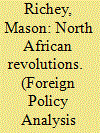

|
|
|
|
|
| Publication |
2013.
|
| Summary/Abstract |
In this paper, I discuss EU and member state externalization of the handling of non-EU, irregular migration flows. Following a historical and theoretical Introduction, I address in section "European Reactions to the Migration Flows Following the Arab Spring" the migration consequences of the 2011 North Africa revolutions, focusing particularly on how they provoked an EU migration policy crisis. Then, I show in section "Migration Policy Development in the EU: Fortress Europe or Strategic Incoherence?" how this was an outcome of the ineffectualness and strategic incoherence of EU immigration policy. This is ironic because the EU is criticized-incorrectly, I claim-for having developed a well-oiled non-entrée regime that skirts human/immigrant rights obligations by externalizing interdiction, detention, and processing of irregular migrants to countries with lower detention standards and higher human rights abuse rates. In section "The Member States' Role in the Externalization of European Migration Policy", I demonstrate that when such externalization policies are enacted, they are less due to EU action and more a function of member state decisions. I show that EU periphery member states are responsible for the most problematic policies partially because constraints on EU-level policy making incentivize these member states to erect "Fortress Europe" through their own devices.
|
|
|
|
|
|
|
|
|
|
|
|
|
|
|
|
| 13 |
ID:
124526
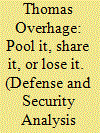

|
|
|
|
|
| Publication |
2013.
|
| Summary/Abstract |
In a general and economical view, this article analyzes methods and mechanisms for the pooling and sharing of military forces and weapons inside the European Union (EU) in times of scarcity. Pooling and sharing could improve the EU military capabilities significantly if differences in location factors were taken into account and all states would focus on their respective strengths. More competition and less concentration are the keys to ensuring guaranteed access to military assets. Pooling and sharing are likely to be successful only if large states enhance their emphasis on collective defense by mutual aid and self-help, and reduce particularistic and parochial interests of local gain. The realm of personnel has the most potential for improvement but any change is likely to generate policy implications.
|
|
|
|
|
|
|
|
|
|
|
|
|
|
|
|
| 14 |
ID:
128251
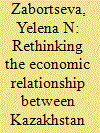

|
|
|
|
|
| Publication |
2014.
|
| Summary/Abstract |
According to their governments, economic relations between Kazakhstan and Russia-the two largest post-Soviet countries-have been exceptionally solid and robust. However, statistical data demonstrate that Russian investments in Kazakhstan's economy have been weak, and that Kazakhstan has only recently increased investment in the Russian economy. This raises the question of whether relations between the two countries have been more uneven than has been claimed officially. The article also explores the influence of off-shore investments via third countries and other aspects of the bilateral relationship between Kazakhstan and Russia and the involvement of each country in the other's economy.
|
|
|
|
|
|
|
|
|
|
|
|
|
|
|
|
| 15 |
ID:
133620
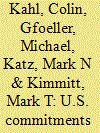

|
|
|
|
|
| Publication |
2014.
|
| Summary/Abstract |
I will focus my remarks on Gulf anxieties as they relate to U.S. foreign policy in the Middle East, specifically as they relate to U.S. policy vis-à-vis Iran, which is very much a hot topic. There are some deep structural sources of anxiety that have created tensions in the relationship between the United States and our closest partners in the Gulf. There is a widespread perception in the Gulf region that the United States is simply politically exhausted with the Middle East as a whole and with the Gulf in particular, after more than a decade of war in Iraq and Afghanistan. I think they see the U.S. drawdown from Iraq and the imminent drawdown from Afghanistan, and they wonder when the United States will start to draw down its 35,000 soldiers, sailors, airmen, Marines and others who are every day on mission in the Gulf region.
|
|
|
|
|
|
|
|
|
|
|
|
|
|
|
|
| 16 |
ID:
132920
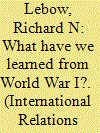

|
|
|
|
|
| Publication |
2014.
|
| Summary/Abstract |
World War I has an important and complex relationship with international relations (IR) theory. The War was the catalyst for the emergence of IR as a discipline and helped to shape the liberal and realist paradigms. The War was also a principal focus of many IR theories. Realists and liberals based theories on it or justified them by arguing that they could account for its origins. Finally, the War influenced theory development in these and other paradigms through new understandings of it developed by historians. These interpretations in turn were often driven by contemporary political problems and projects. Theory, World War I, and the contemporary world are accordingly linked in direct and indirect ways. I cannot possibly unpack this relationship in a short essay. Rather, I want to illustrate with a few examples of the way in which contemporary political events and intellectual developments have encouraged new understandings of World War I. That conflict emerges as a resource, but one used in so many ways that it increasingly comes to resemble a Rorschach Test.
|
|
|
|
|
|
|
|
|
|
|
|
|
|
|
|
|
|
|
|
|